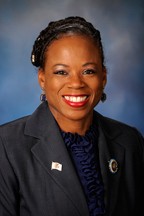![]()
Chicago, IL – June 1, 2021
Last night the General Assembly took a critical step towards equitable higher education funding by passing SB815, a bill creating the Commission on Equitable Public University Funding. This bill builds on the Illinois Legislative Black Caucus’ landmark education bill that passed earlier this year during January’s lame duck session, and reflects months of negotiations and collaboration with stakeholders across higher education. The Commission, made up of a diverse set of higher education stakeholders, will research, model, and ultimately recommend specific criteria and approaches for an equity-based higher education funding model for public universities, as Illinois did for K-12 when it created the Evidence-Based Funding model in 2017. This is vital to rebuilding a prosperous and equitable future for Illinois, and the Illinois Higher Education Network (IHEN) applauds Leader Kimberly Lightford and Leader Carol Ammons for their steadfast leadership on this bill.
While great strides have been made to address K-12 funding inequities, and stakeholders have provided recommendations to improve funding in early childhood education, the same cannot be said for higher education. In fact, Illinois may be the only state without a formula to distribute base funding to its universities.
Disinvestment, racial and socioeconomic gaps in access, and inequitable distribution of state funds have forced Illinois’ Black and Latinx students and students from low-income families to pay some of the highest college costs in the nation. The state’s public colleges and universities disproportionately serving students from low-income households and students of color are also its most financially vulnerable. Although these institutions need more funding to support students, they instead receive a fraction of the state’s annual appropriations.
With the passage of SB815, the state can now learn from and build on state and national research and existing legislative efforts through the Illinois’ legislative bipartisan, bicameral Higher Education Working Group led by Representative Katie Stuart, to recommend an adequate, equitable, and stable higher education funding model that ensures every university can provide adequate academic, financial, and social-emotional student supports.
We thank the General Assembly and look forward to the work ahead.
Advance Illinois
Partnership for College Completion
Women Employed
Young Invincibles
Illinois Higher Education Network



